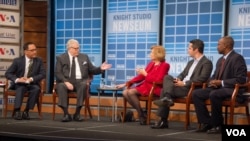The Islamic State group has mastered the use of social media to promote its cause like no other extremist organization, experts said Wednesday in Washington. The panel discussed the Islamic State group's adept use of social media and propaganda to recruit members worldwide in a televised special: ISIS and the Digital War - hosted by the Voice of America and the Newseum Institute on Wednesday, October 21st.
“The Islamic State group differs from its predecessor, al-Qaida, in delivering its message,” said Lorenzo Vidino, director of the Program on Extremism at the Center for Cyber and Homeland Security at George Washington University. “Where al-Qaida released long, verbose statements by leader Osama bin Laden,” Vidino said, the Islamic State group has been able to "capitalize on social media. ...They have the ability to market that message in a very clever way." Harun Maruf, senior editor with VOA's Somali news service, said al-Qaida is quite effective. "This recruitment takes place in a very short time," he said, “sometimes within a few months."
Vidino, an academic and security expert who specializes in Islamism and political violence in Europe and North America, said the Islamic State group has also been "very effective" at sending its message out to different audiences, especially the young. He also said the recruitment materials appeal to a certain segment. "People who join are seekers of knowledge," he said. "Forty percent are people who do not have a clue about the basics of Islam -- so they go online." Maruf said families are key when trying to combat the Islamic State's slick media message and signs of radicalization. He added that families should watch for warning signs, such as changes in behavior or complaints about the West. The recruitment "happens in chat rooms, it happens in the home."
Michael Weiss, an American journalist specializing in Syria and the Middle East and a senior editor at The Daily Beast, said the Islamic State group has "a coherent narrative, it’s very attractive and it's conforming." Weiss has reported on the group for several years, and suggested a two-pronged approach to countering it: stem the flow of foreign fighters and engage the government of Syrian President Bashar al-Assad. "I have argued...until you engage the Assad regime, that government is a magnet for jihadist elements." Gene Policinski, chief operating officer of the Newseum Institute, said that young people tend to get their news from other people their age or their friends. He said the message seems attractive to youth because it is selling a "utopian" view of the religion.
However, the Baroness Emma Nicholson of Winterbourne, president and chairwoman of the AMAR International Charitable Foundation, said the Islamic State message is completely un-Islamic. "They don't know anything about Islam," said Nicholson, who regularly travels to Iraq and leads the charity's work to support hundreds of thousands of more than 3 million Iraqis displaced by Islamic State militants. According to Islam, "you can’t show any image – all this social media is absolutely un-Islamic."




